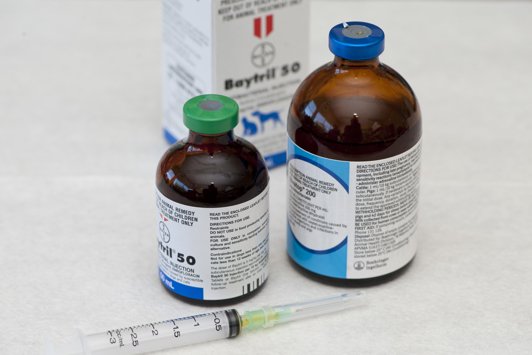When using chemicals on animals:
- follow all label or veterinary directions
- use only registered veterinary chemicals
- declare withholding periods on the national vendor declaration form
- keep records of all veterinary treatments given to animals.
By following these requirements, you help to maintain Australia’s well-earned reputation for safe, reliable animal products.
Veterinary chemicals are substances used to prevent, diagnose, treat, modify and alleviate disease or injury. Veterinary chemicals include prescription medicines (such as antibiotics) and over-the-counter products (such as drenches and vaccines).
The most common veterinary chemicals used on livestock include:
- drenches for intestinal worms
- lice, blowfly and tick treatments
- vaccines to protect against infections such as pulpy kidney, tetanus and scabby mouth
- antibiotics for bacterial infections
- anti-inflammatory medicines for pain relief.
You are only allowed to use registered veterinary chemicals on livestock, bees, fish and crustaceans. When used according to label directions, registered veterinary chemicals are safe for livestock, bees, fish, crustaceans, people and the environment.
Veterinary chemicals are registered by the Australian Pesticides and Veterinary Medicines Authority (APVMA). The APVMA makes assessments on safety for people, animals, the environment and risk to trade before registering a veterinary chemical. During this process, the APVMA also assesses residue risk and establishes withholding periods.
Unregistered veterinary chemicals (such as plant chemicals, home remedies) cannot provide the same level of confidence around safety and residue risk. Their use may put animals, people or the environment at risk and result in residue contamination.
The community demands meat, fish, crustaceans, eggs, honey, milk and fibre be free of harmful chemical residues. Harmful chemical residues are a food safety risk and will impact on trade.
Antibiotic resistance is a growing concern for human health. Similar antibiotics are used to treat livestock and people. Great care must be taken to minimise resistance so these antibiotics remain effective in the fight against infections.
People involved in the care of livestock, bees, fish and crustaceans can only use veterinary chemicals under strict legislative controls. These controls apply to all veterinary chemicals used on trade species animals. All states and territories have legislation controlling the use of chemicals on trade species animals to safeguard people, animals and the environment.
In Western Australia, the legislation is called the Veterinary Chemical Control Regulations 2006.
What animals do the laws apply to?
The Veterinary Chemical Control Regulations classifies animals into two groups. The classifications allow the regulations to define the type of chemical use permitted for each group:
- major trade species – cattle, sheep, pigs, meat and layer poultry (including chickens, turkeys, ducks, geese) and bees
- trade species
- ostrich, emu, deer, goat and aquaculture species and includes the major trade species (cattle, sheep, pigs, meat and layer poultry, bees); or
- an animal kept or used to produce hide, hair or fleece; or
- any other animal that produces food for human or animal consumption or is used as food for human or animal consumption.
Are cats and dogs included under these laws?
No.
Companion animals such as dogs and cats are exempted from these laws.
You must abide by the following rules for veterinary chemical use:
- Follow all veterinary directions. Veterinary directions override label directions.
- Do not use unregistered chemicals on livestock unless directed by a veterinarian.
You can use a veterinary chemical registered for major trade species (cattle, sheep, pigs, poultry and bees) in a trade species if:
- this use is not contrary to a label restraint or label precaution on the label; and
- instructions for use on a major trade species animal (cattle, sheep, pigs, chickens and bees) are mentioned on the label; and
- the person uses the product on a trade species animal which is not a major trade species animal, and
- the use is not by injection unless the label gives instructions for use by injection.
Failure to observe these rules may result in financial penalty.
The rules are different if you are a veterinarian.
Yes.
Good record keeping is essential to ensure the animals you sell do not contain harmful chemical residues.
You are required by law to record the following information:
- individual animal or group identification
- name of the product
- date of administration
- dose administered
- treatment period
- withholding period (WHP).
Chemical records must be kept for three years, including any written advice from veterinarians. You may be asked to produce these records. Failure to keep records and produce them on request may result in a financial penalty.
Chemical records are required to support any chemical use declarations in a national vendor declaration (NVD) form or PigPass NVD when selling livestock.

